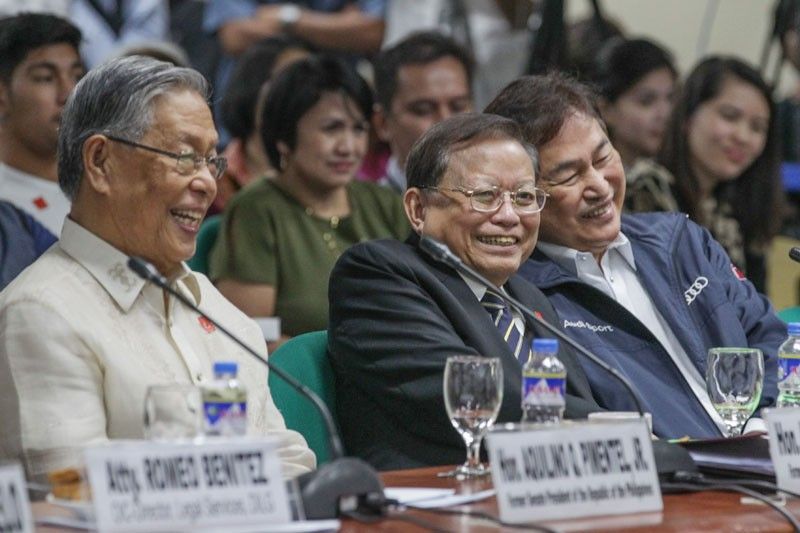Senate stops Charter change train

Former chief justices Hilario Davide Jr. and Reynato Puno and former Supreme Court associate justice Adolf Azcuna share a light moment before the start of a Senate hearing on the proposal to amend the Constitution yesterday. Geremy Pintolo
MANILA, Philippines — The speeding Charter change train from the House of Representatives has stopped dead in its tracks as senators vowed to resist pressure to rush the crafting of a constitution for a federal government.
After the House hastily voted to convene Congress as a constituent assembly in Joint Resolution No. 9, senators held a caucus during which they unanimously agreed to oppose any joint voting and joint session under the con-ass.
Senators s aid they could just sit on Joint Resolution No. 9 while tackling their own Charter change (Cha-cha) proposals in a more careful manner.
The senators also expressed openness to Sen. Panfilo Lacson’s proposal to expel any senator who attends the con-ass called by the House.
Senate President Aquilino Pimentel III said it would be confusing if members of the two chambers would be physically together in a con-ass but would vote separately over every proposed amendment to the Constitution. Pimentel said the House resolution would simply be consigned to the reference of business of the chamber and likely referred to the Senate committee on constitutional amendments, chaired by Sen. Francis Pangilinan, who presided over a hearing yesterday.
“We have to follow the same procedure to have proposed amendments to the Constitution. If not, then there’s none,” Pimentel told reporters.
When asked about the marked difference between the resolution and the proposal of Sen. Panfilo Lacson for the Senate to hold its own con-ass, meaning separate from the House, he said: “If the Cha-cha is a dance, the two dancers or two partners must dance the same dance.”
“If they’re dancing different dances, then we don’t have a Cha-cha,” he said.
Senate Majority Leader Vicente Sotto III said the House approval of its resolution won’t “influence us into anything.”
“We will still, and based on our caucus and our decision, we will still proceed with our regular system – the system that we know, which is we hold hearings and listen to all those who must be listened to, and we’ll make a decision thereafter,” Sotto said.
Lacson emphasized the House cannot force the Senate to do its bidding, especially on Congress leaders’ proposal to cancel the elections and extend the terms of office of officials.
“They have Resolution No. 9 – we’ll not act on it. And we’ll just deliberate among ourselves on the (Charter change) mode,” Lacson said.
“If we don’t agree (with the House), it’s as if nothing’s been passed in the House,” he said.
Pangilinan said the situation could be described as a stalemate, as the Senate would not allow any railroading of Charter change, especially that the people and lawmakers have yet to have a full grasp of federalism.
Dead
Senate President Pro Tempore Ralph Recto said Charter change in the Senate is “dead,” and will remain so especially if House leaders insist on pushing for it, including by scheduling a plebiscite simultaneously with the barangay and Sangguniang Kabataan elections in May this year.
“Clearly, we cannot do it in 10 session weeks, not to mention the possibility of the Senate being an impeachment court once again, not to mention we have to pass other laws as senators, as members of Congress,” Recto told the hearing.
“Based on what I’ve heard today, Cha-cha is dead in the Senate,” he said.
He said since he started public service in 1992, there has been no clamor for Charter change, much less a shift to a federal system.
During the committee hearing, Senate Minority Leader Franklin Drilon asked former chief justice Reynato Puno whether the Supreme Court (SC) can compel the Senate to act on the resolution calling for a constituent assembly.
“The Supreme Court still does not have jurisdiction to accommodate and decide questions that are political in character. The issue that we are talking about is a political question,” Puno replied.
Puno said the SC is unlikely to entertain the case as the matter between the Senate and the House is political in nature and therefore not in the province of the high tribunal.
Puno, former chief justice Hilario Davide and former SC justice Adolf Azcuna – also one of the framers of the 1987 Constitution – voiced the opinion that the Senate cannot be forced to adopt what the House wants.
They said the two chambers should be voting separately in amending the Constitution.
“If we do not act on the House resolution calling for a constitutional assembly, the issue cannot be brought to the Supreme Court?” Drilon asked, to which Puno replied in affirmative.
“The resolution is lost and you cannot be subject to a writ of mandamus,” Puno added.
Drilon earlier castigated the House leadership for disparaging the Senate for being “slow,” which he said was meant to condition the minds of the people to the supposed necessity of abolishing the chamber.
Lacson said several scenarios were discussed during the caucus, including the remote possibility that a senator might decide to ride the House Cha-cha train and attend the lower chamber’s version of the con-ass.
He said the House could then claim a joint session with the Senate.
“Since we’ve agreed that we will not allow ourselves to be drowned out… I said to make things firm, let’s agree to expel any member who will participate in such an arrangement without any resolution adopted by the Senate,” Lacson said.
He, however, stressed that he does not believe any senator would break the agreement.
But if there’s one senator who does not seem bothered by the consequences of a Cha-cha, it’s Sen. Manny Pacquiao.
“As I said, I don’t care about my position. If federalism will be good for the country, or if it will mean abolition of the Senate or Congress, I don’t care as long as it is good for the country,” he said in Filipino in a TV interview.
Con-con
Also at the hearing by the Senate committee on constitutional amendments, legal and constitutional experts expressed unanimous support for a constitutional convention (con-con) as the mode of amending the Constitution, but were divided when it came to the question of whether or not Charter change should be done immediately.
“To insure a truly impartial, objective and comprehensive discussion on this crucial issue of federalism or the entry into our midst of a foreign invader, I respectfully submit that the matter be left to a constitutional convention, with delegates duly elected by the people for that purpose,” Davide said in a statement he read during the hearing.
According to Puno, the country has no experience in con-ass and that giving Congress the task of revising the Constitution would only add to their mandate of writing laws.
Puno noted that Congress would also soon be preoccupied with the forthcoming impeachment of Chief Justice Maria Lourdes Sereno.
“More importantly, some members of Congress may find themselves in a conflict situation in the course of rewriting the Constitution,” he said.
Puno also brushed aside the arguments being made by the proponents of con-ass that con-con is more expensive.
“To me that is a cheap argument. We should not count the cost when rewriting the Constitution,” he said.
Former senator Aquilino Pimentel Jr., father and namesake of the Senate president, said he has no doubt on the viability of con-con but admitted it would be costly to assemble one.
- Latest
- Trending






























